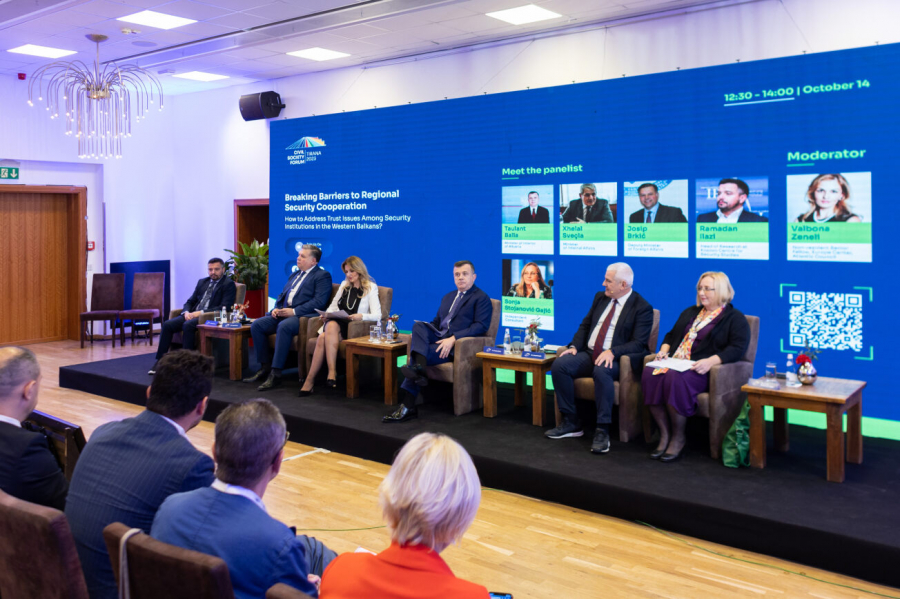Tirana, October 14, 2023: Berlin Process Summit's Civil Society and Think-Tank Forum saw an insightful discussion in the panel titled "Breaking Barriers to Regional Security Cooperation," highlighting the urgency of addressing trust issues among security institutions in the Western Balkans. A panel of experts and policymakers from the Western Balkans examined the current state of regional security cooperation and outline strategies for enhancing collaboration. The panel included: Taulant Balla, Minister of Internal Affairs of Albania, Xhelal Sveçla, Minister of Internal Affairs of Kosovo, Josip Brkić, Deputy Minister of Foreign Affairs of Bosnia and Herzegovina, Ramadan Ilazi, Head of Research, Kosovar Centre for Security Studies and Sonja Stojanović Gajić, Independent Consultant, moderated by Valbona Zeneli, Non-resident Senior Fellow, Europe Center, Atlantic Council
The discussion, which unfolded in the backdrop of significant regional event of the Civil Society and Think-Tank Forum of the Berlin Process, underscored the importance of fostering stronger security ties among Western Balkan countries for European integration and safeguarding against transnational threats.
Key Discussion Points:
- Geopolitical Shifts and European Integration: The panel commenced by acknowledging the profound impact of the Russian invasion of Ukraine, which has reshaped geopolitical dynamics. This event has renewed efforts to bring the Western Balkans closer to the European Union. Effective security cooperation was identified as central to this integration process, with the panel exploring strategies to boost trust and collaboration among regional security institutions.
- Kosovo Security Situation and Unresolved Bilateral Disputes: Concerns were raised about deteriorating security situation in Kosovo and heightened ethnic tensions, particularly the terrorist attack that occurred on September 24, 2023. Some of the members of the panel emphasized the need to address this threat. Unresolved bilateral disputes in the Western Balkans, chief among them, the lack of progress in normalization of relations between Kosovo and Serbia presents a major obstacle for regional cooperation and integration. Both governments in the region and the EU must prioritize investments in reconciliation. Participants advocated for the establishment of a dedicated European Union facility to facilitate grassroots reconciliation efforts in WB6. Also, political leaders must change rhetoric and promote reconciliatory messages.
- Irregular migration: Western Balkans is exploited as a route for irregular migration into the European Union. Albania, Kosovo, and Montenegro have ongoing effective protocols of police cooperation since 2018 in curbing various forms of transnational crime and irregular migration. Frontex presence in the region is considered important to counter irregular migration.
- Democracy matters for regional security: A strong commitment of the governments in the Western Balkans towards the values and principles of democracy is crucial for greater regional cooperation and integration. Autocratic tendencies as well as poor media freedom in the region undermine both the European and regional integration. The panel also examined the issue of malign foreign influence and how organized corruption and corrosive capital facilitate such influence.
- Cybersecurity: Cyberthreats pose a significant challenge for all countries of the Western Balkans. A proactive early warning system for cyberthreats is crucial, and this can only be achieved through a common approach from the WB6. A Center for Cybersecurity Capacity Building in the Western Balkans is being established in Montenegro, supported by France and Slovenia. All governments in the region should be able to benefit from this center. Integration of the Western Balkans in the work of the European Union Agency for Cybersecurity (ENISA), as well as in the EU Cybersecurity Incident Review Mechanism is of outmost importance.
- Inclusive Regional Security Cooperation Initiatives: There are many regional initiatives for cooperation in the Western Balkans, but they are often not inclusive and lack focus. We need a process of rationalization of regional security cooperation initiatives that streamlines them but also fosters inclusivity. The lack of Kosovo’s participation in many of these regional initiatives presents a major concern for overall regional security cooperation.
- Collaboration with European Institutions: Collaboration agreements with the European Public Prosecutor's Office are crucial and therefore all WB6 should conclude cooperation agreements as soon as possible. Furthermore, Western Balkans countries should fully align with the EU’s Common Foreign and Security Policy (CFSP), as well as their visa policies with the EU’s Schengen Zone.
- Media and Disinformation: The panel highlighted the role of the media in disseminating disinformation and the need for more support in combating this issue. A unified approach to address media-related challenges was underscored.
The forum's overarching message emphasized the need for the leaders of the WB6 to seize on the new momentum that has been created and promote greater cooperation.
